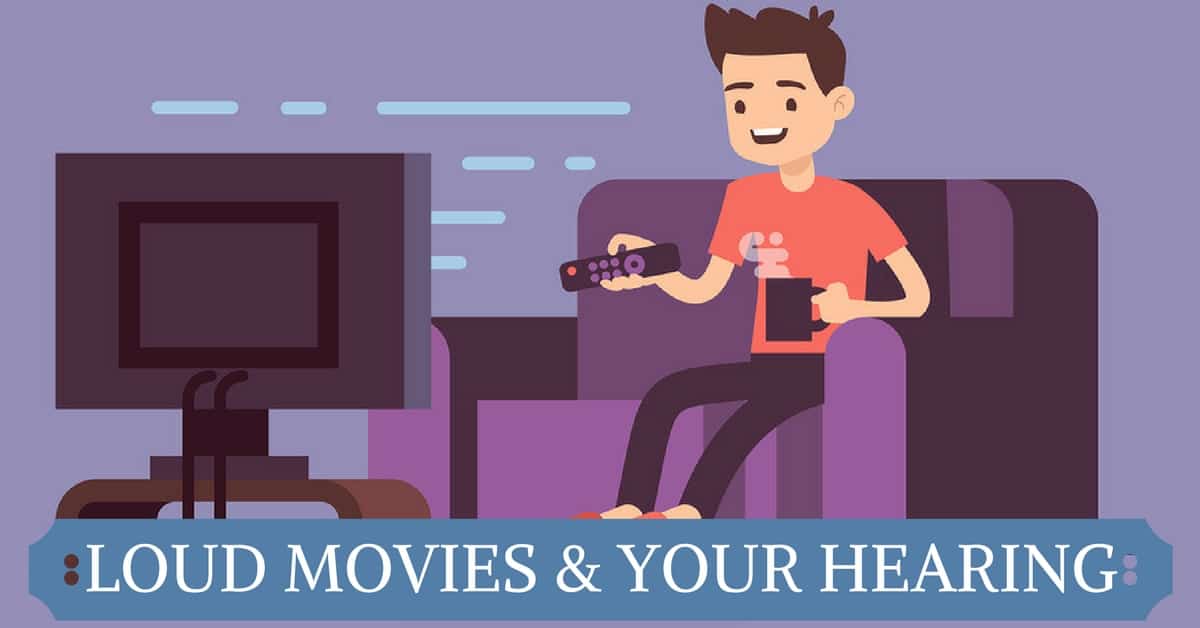
As fall approaches and nights get colder, you start looking for alternatives to Thursday evenings in the park. Who doesn’t love seeing a good movie at the theatre with the comfiest seats and the saltiest popcorn? But before you plan your next movie night, take a moment to consider how two hours in a movie theatre could affect your hearing. Have you thought about how loud it gets in some theatres? According to the American Hearing Research Foundation, movie theatres can be “a source of premature hearing reduction.”
Let’s Talk About Decibels
Movies are usually around two hours long. If sound levels exceed 85 decibels (dB), you will start to notice a ringing in your ears, or experience temporary hearing loss, a sure sign that you’re damaging your hearing. After 85 dB, “you start to hit into the range where you could potentially cause some damage,” says Kit Frank, Audiologist at the NYU Langone Medical Center. If you can’t hear the person sitting right beside you it’s too loud, and your hearing is in danger. To put that into context, normal conversation is around 60 dB, traffic noise is around 80 dB, and a chainsaw up close is 100 dB. If you’re exposed to sounds of over 110 dB, even for a minute or two, you will suffer immediate damage to your hearing, and some of the fragile hair cells in your inner ear will die.
How Loud Are the Movies?
To find out how loud your favorite feature films are, TODAY national investigative correspondent Jess Rossen took a decibel reader to several movie theatres to test the sound levels. The popular movie The Magnificent Seven, which features a lot of gunfire, was over 93 dB for most of the film, and peaked at 97 dB. That’s about average for an action-packed movie. Rossen also measured sound levels in Deepwater Horizon. With lots of explosions, the movie was often over 100 dB, and even reached 105 dB at one point.
While there are industry standards in place regulating how loud films can be, it’s still up to the theatre to control the volume. They try to keep the average levels at around 85 dB to protect patron’s hearing, but aren’t too concerned with the spikes in sound that are much louder. While quiet conversation scenes will be under 85 dB, scenes involving explosions, gun shots, or car chases can be over 110 dB. If you’re going to see an action-packed film, your ears are in for a beating.
Are Trailers Louder than the Feature Film?
Do you always arrive in time for the trailers? These often seem far louder than the feature film, and leave you wishing you’d opted to find your seat in the dark rather than subject your ears to the noise. It’s not that movie theatres crank up the volume for the first few minutes. Trailers are made with all the exciting (and very loud) action scenes packed into these short clips. String a few trailers together, and you will experience hearing damage before the movie has even started.
Protect Your Hearing
"If you leave the movie theater and your ears are ringing that's a sign that you could potentially have some damage from the loud noise," Frank said. Even spending two hours watching a movie at 85 dB will hurt your ears, and the frequent spikes, particularly in action movies, aren’t kind to your ears. For those of you who work in noisy sectors like manufacturing, farming, or construction, your ears are often tired by the evening, since you spent 8 hours or more at an excessively loud jobsite of 85 dB or higher. Your ears need a rest, and an extremely loud movie theatre is not the place to do that. Avoid movie theatres on weeknights, and plan your movie date on the weekend when your ears are more rested.
Just like Rossen, you can easily take a decibel reader into the theatre with you. There are a number of free smartphone apps that will tell you how loud it is around you. If the movie gets too loud, consider stepping out of the theatre to give your ears a rest, or pop in a pair of earplugs. If you’ve experienced any recent changes in your hearing, visit us at My Hearing Centers for a hearing test and consultation.
